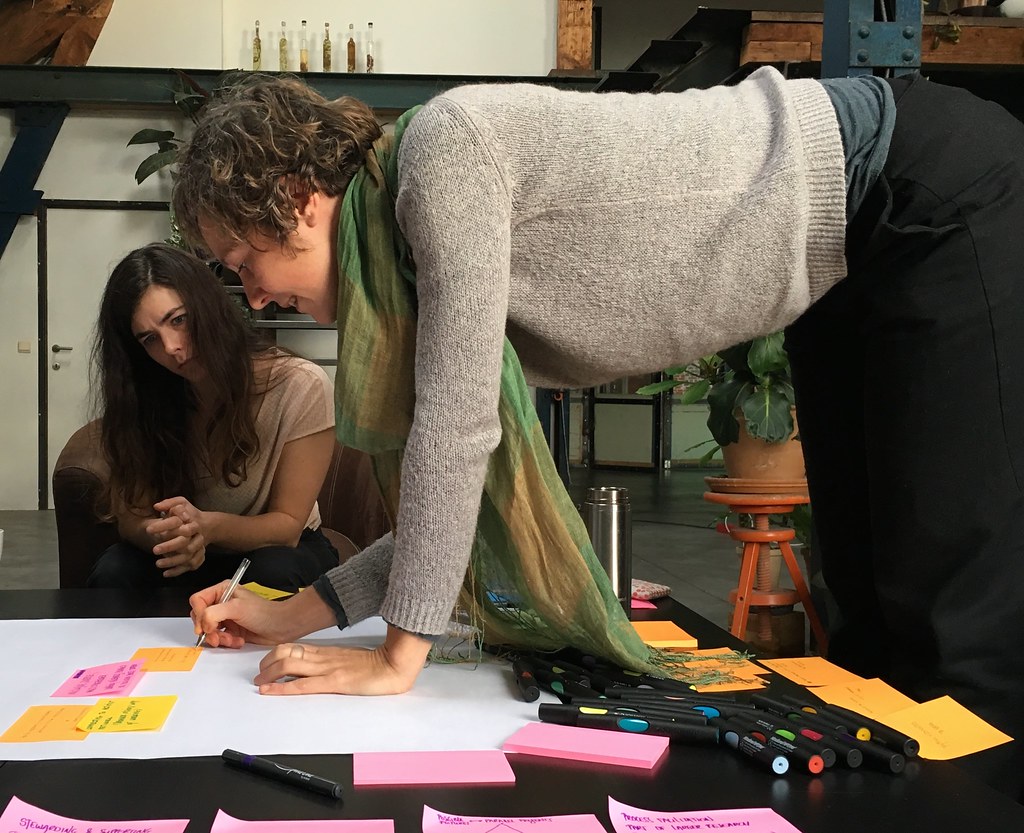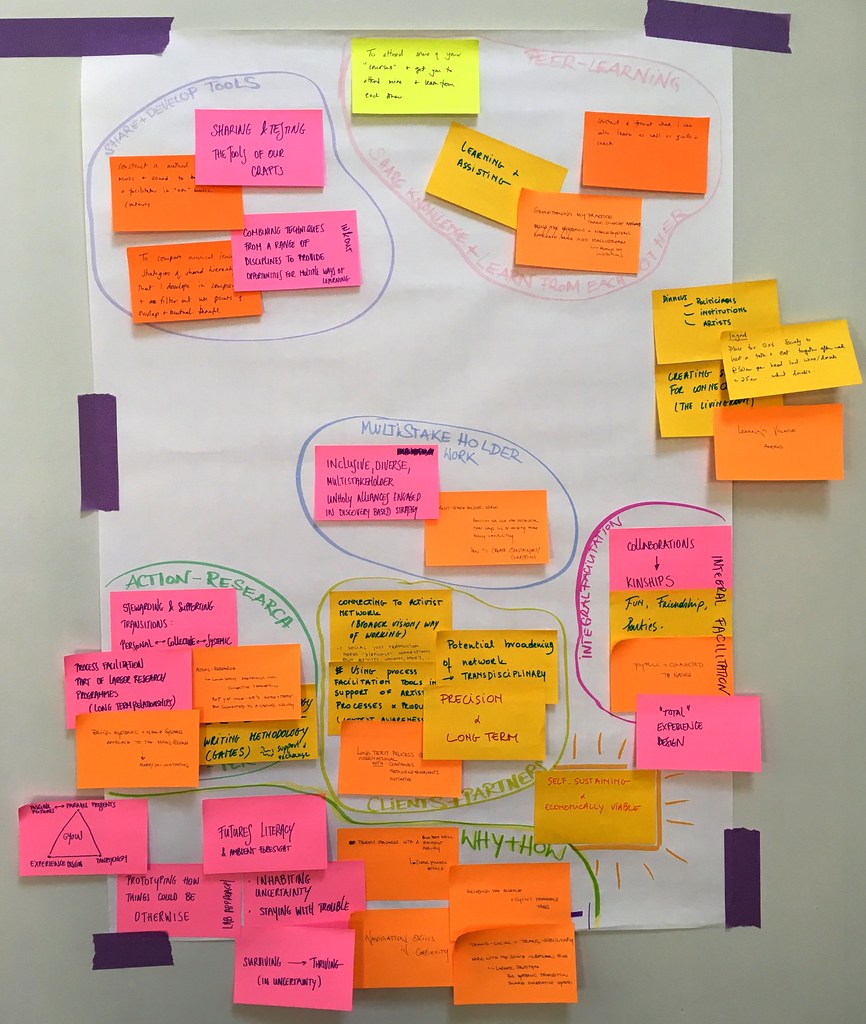Table of Contents
AKIN Gathering
AKIN = Integrative Process Facilitation Working Group
16th December 2016 @ FoAM BXL
Host: Luea Ritter
Participants: Ingrid Vranken, Stevie Wishart, Maja Kuzmanovic, Luea Ritter
Intentions and Questions
Morning:
- Our individual aims, wishes and scales for this work ?
- Clarifying how this working group is and wants to be part of our different work lives ?
- What are the different threads within this working group and who holds engagement and commitment to which areas of focus
Afternoon:
- Systems Mapping
- Tangible commitments and engagement for the coming time
- Next steps

The Work
In detail and in progress about our work with Integrative Process Facilitation
Why and how
- Navigation skills in complexity
- Process stewards with a long term vision (our own inquiry), with clear values and ethics
- Inhabiting uncertainty and staying with the trouble
- Moving from surviving to thriving
- Lab approaches - prototyping how things could be otherwise
- Including the subtle and cyclical threshold times (e.g. seasons)
- Trans-local and trans-disciplinary work with the space in between silos (larger prototype for stystemic transition towards generative systems
- Ambient/embodied foresight and futures literacy
- Moving away from anthropocentrism and towards pan-psychism (everything around us has a sentience)
Action research
- Stewarding and supporting transitions (personal → collective → systemic)
- Process facilitation part of larger iterative research programmes (developing long term relationships)
- Bring systemic and whole systems approach into the mainstream (always on invitation)
- Action research - long term deepening into collective transition (not just one-offs here and there) but connected to a larger inquiry
- Developing our own research and writing methodology (games)
Integrative facilitation
- Our inner work supports our facilitation skills and approaches (the facilitator is an embodiment of the work)
- Collaboration → kinships (including building personal connections, doing + being)
- Multisensory experience design
- Joyful work, in the flow
- Connected to nature
- Celebration, fun, friendships and parties should be a part of the facilitation process
Process facilitation for Multistakeholder networks
- Inclusive, diverse, multistakeholder, unholy alliances engaged in discovery based strategy
- diverse, transdisciplinary networks
- Creating containers, conditions, frameworks: How can we use the potential that lays in diversity more fully and explicitly
Economic sustainability
- discerning, precise and long term relationship with partners
- valuing our work
- economically viable activities and structures
The working group functions as a Peer learning environment
- share knowledge and learn from each other
- first internally, then possibly extend towards a “guild” - creating learning environments and capacity building for embodied practice of process facilitation for others
- Apprenticeships (learning and assisting)
- Strengthening individual practice through diverse approaches
- A platform where we can learn from others as well as guide and coach
- “witnessing” each other’s work (like a fly on the wall)
Toolbox
- Sharing and testing the tools of our crafts (from pens to process techniques)
- creating a growing repository of techniques and methods
- Combining techniques from a range of disciplines to provide opportunities for multiple ways of learning (including interaction between process facilitation and methods, strategies and composing techniques from music)
On the edge (members’ interests that might or might not be part of The Work when we clarify its scope and purpose)
- Facilitated dinners with politicians, institutions and artists (Ingrid)
- The Living Room, creating a space/place for connections (Ingrid)
- Facilitated Oxford Society dinners with a speaker (Stevie)
- Learning Village Andros (Luea)
- The triangle: Futures, Experience design and Panpsychism (Maja)

Systems map
Inner circle: AKIN - CORE (Committed are: Maja, Stevie, Ingrid and Luea):
- Stewards and Fire Keepers of the AKIN
- Committing to the Whole with Awareness and Clarity around Time Engagement, Resources…
- Working on the Resource-Flow
- Bringing in Contacts, Connections, … and weaving it
- Holders of Governance
Second circle: SHELL (…) involves people that:
- Share the values and principles
- Are not always present
- Carry less responsibility for the Whole
- Get asked/called regarding specific knowledge that would be needed at various points
- People the Core knows and trusts
- Can propose projects
(NOTE: this circle might be too ambiguous. we might end up having only the core and the membrane)
Outer working group circle: MEMBRANE/POOL:
- Affiliates, associated members
- Newcomers
- Single Connection with people in the Core
- Specific and new knowledge and skills (experts, specialists)
- Get invited for shorter term and specific collaboration
Existing wider networks: CURRENTS - people, organisations, initiatives within our existing networks
Potential networks: OCEAN - people with whom we don't have an established contact, but would like to involve
The CURRENTS and OCEAN are people who hold a question, inquiry or intention for a systemic shift. They are people whom AKIN can work with (beneficiaries) and people/entities who can support AKIN in developing The Work and achieving meaningful outcomes.
- Partners
- Clients
- Funders
- “Ambassadors”
- …

Next Steps
- Luea & Maja: transcribe notes and put them online
- Ingrid: check out deadlines Horizon 2020 & NESTA
NEXT MEETING: 13/03 Whole Day
- Function & role of core + governance
- 1 clear stream > clarify The Work
- Next Actions and Steps

